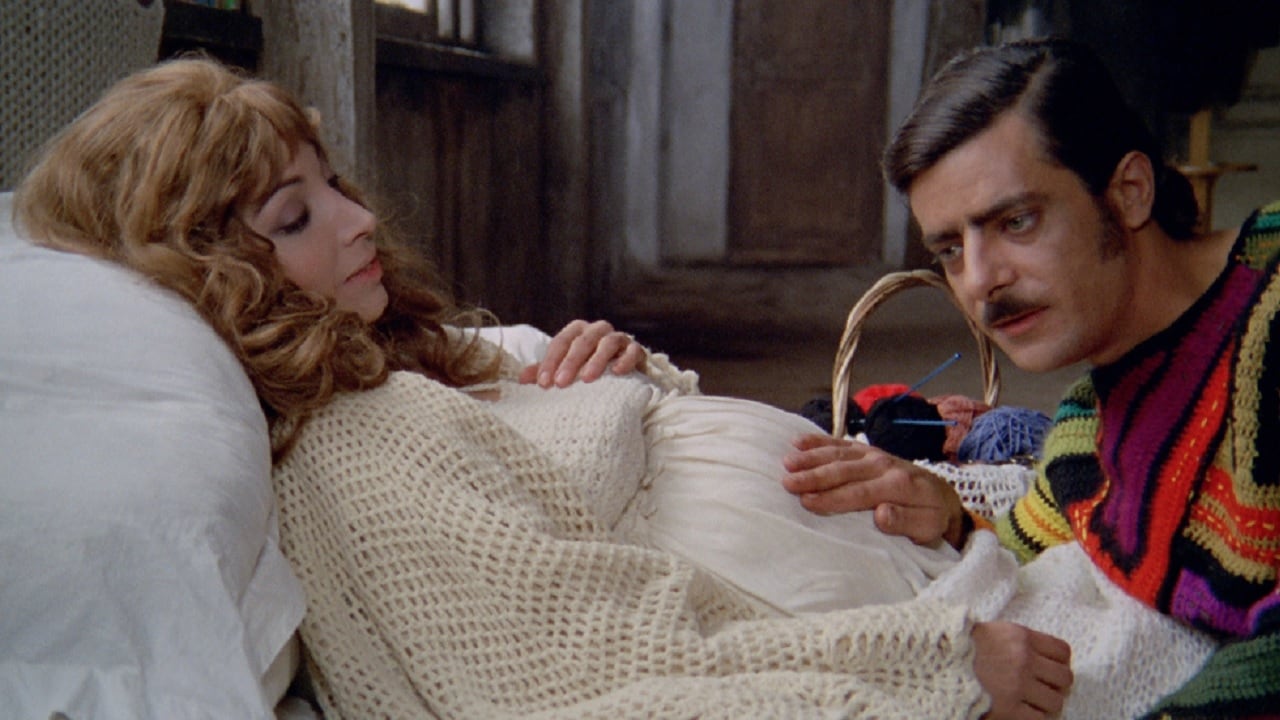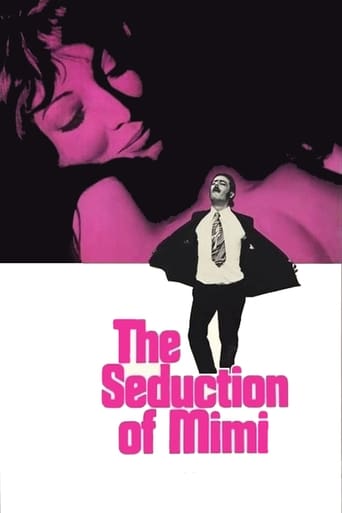

As a woman director in the early seventies, in a series of films Lina Wertmuller took on the issues related to gender and sexual revolutions, feminism and entrenched politics and economics. This work is one of them.As is true of this part of her oeuvre, the film works on many levels. The director is never satisfied with merely going after the easy laughs. Any viewer looking for social commentary, both in the main story-telling and the subtext will come away satisfied.This is a very "Italian" and "European" movie, in the sense that it captures the spirit of the times: both of the Italian North/South cultural wars/divide and of a particular European concern with the strength of "left" political and artistic movements and explorations of alternative, non-materialistic life-styles.All of this is shown as experienced by Mimi, a southern Italian everyman, buffeted by fate. In this role, Giancarlo Giannini once again shows his mastery of the acting craft. As is true for all foreign films, my advice is that if you don't know the language of the original, always view the subtitled version, so as not to miss the subtleties of the individual performances.I won't give away any of the plot. Just want to note that (as an architect, not a formally- trained film-maker) I can still appreciate the choices made by the director and cinematographer in telling the story. This is true for a thousand details. In the case of this film, the inspired choice of the camera lens ("fish-eye") for the scene between Giannini and Elena Fiore toward the end of the movie, adds immeasurably to its effectiveness. See for yourself and ROTFL.
... View MoreGiancarlo Giannini plays a simple Southern Italian worker who unwisely thinks his local elections aren't 100% rigged by the local mob. Assuming it's a truly secret ballot, he disobeys the mobs instructions and votes for a local Communist instead. Well, he nearly gets himself killed in the meantime and is forced to run to Turin in the north. There, quite by accident, he runs afoul of the mob AGAIN and is nearly killed. In fact, this happens a lot in the film and the generally apolitical Giannini tries to play BOTH sides to his own benefit. In addition, he begins sleeping with several different women--once again hoping he can somehow balance it all and keep from getting killed. Despite all the many, many dangers, Giannini is somehow a survivor and the film has many cute little twists and turns.I can tell that this satire was meant to be very funny, but I just didn't find myself laughing. While it is a good film, it's certainly not among the more memorable Italian films I have ever seen. It's slightly better than a time-passer, but that's really about all. I think the biggest reason for this isn't due to the humor but more to the fact that Giannini's character is a real selfish jerk. Had he been more sympathetic, I really think the film would have been more memorable. However, considering this film won many awards and was pretty well respected in its day, it is quite possible I am just an idiot. See it for yourself, but just be surprised if you, too, don't find the film all that interesting--or you think I am a lousy reviewer!
... View MoreIf I were to advice one movie by Lina Wetrmuller - one of the finest Italian directors ever - it would be this one. For this and other movies, you miss a lot of it if you're not Italian, both for the language and for the politics. It is also one of the most political, as it gives a rather crude display of how the industrialized north of Italy exploited the manpower of the less developed south. But it's also a moving love and passion story, and an hilarious comedy. Also, the Giannini-Melato duo is at its best. SORT OF A SPOILER AHEAD: I think the message it delivers is rather a pessimistic and disillusioning one: Mimi' tries to keep his political ideals and his (relatively to his background!) advanced view on love and relationships, but is then bound to fall back to his conservative cultural heritage: on the sentimental side, he's still too jealous of his wife to let her live as free as him; on the political side, as he says in the end, "they're all cousins!" - there's no point in fighting the collusion of political, economical and criminal power that we still have in Italy..
... View MoreI recently saw this film for the first time. A recent poster said this movie leans "against" social issues....I tend to see the film as capturing a dialectic between the personal and the political... it is political in at least 2 ways that I can see....1) it shows the outrageous inadequacy of bourgeois "democracy" to defend the interests of working people...the Mafia and its candidates who echo the ideology of fascism in the film represent capitalism as both the fulfillment and the negation of the democratic "facade"... (the lead character's descent into crass opportunism as well as his sexual aggression, it is to be noted, are NOT rewarded in the film...at the conclusion, he is profoundly alienated in a scene reminiscent of the final cut of Fellini's La Strada- probably some homage here).... 2) and this is probably the more dominant politically significant theme---this film attempts a radical critique of the institution of bourgeois marriage, through the destructive and artificial role that marriage plays in the film...not only in terms of the patriarchal double-standards, but in the institution's incapacity to most fully satisfy human strivings- female OR male.Whatever one can say about this film, I think anyone who sees it in anyway as a criticism of Communism is misreading the film....Certainly, a member of the Italian Communist Party (PCI) might understandably cringe at a Party supporter's (Mimi) sexual aggressiveness....but Mimi is apparently a Party "supporter" in the narrowest sense- only in the sense of voting for the Reds (remember PCI has long been a sizeable and popular Party in Italy), and by the end of the film he has DESCENDED to campaigning for a fascistic-Mafia-backed candidate....and the attitude of the PCI towards such a character as Mimi is symbolized by his comrades abandoning him in their red sickle-and- hammer-displaying wagon, disgusted at his sexism and misogyny, with hisopportunistic supporting of rightist candidates obviously the final straw....interestingly in La Strada, the lead character is much worse in terms of violence and maliciousness, and yet Wertmuller leaves us with LESS sympathy for Mimi than does Fellini for the lead role in La Strada, she thankfully spared us gratuitous "pitying" close-ups of Mimi bawling his eyes out.His girlfriend in Turin is NOT a Communist, i.e. a member of the PCI, as she makes clear, but apparently a former-Trotskyite-turned-quasi-Maoist who defensively emphasizes her "independence" from the Party (Trot to Maoist is an unlikelytransformation, btw, since Trots and Maoists are notoriously antipathic to each other-- the only thing uniting them being their dislike of the regular Communist Party)...anyway, if this is kind of ranty it's because I've only seen it once, and I have a lot of thoughts....if a movie gets me thinking like this one, it is on some level a success, I suppose. I enjoyed this film, and particularly felt the ending tied it all together well, and was more satisfying than I would have anticipated.
... View More